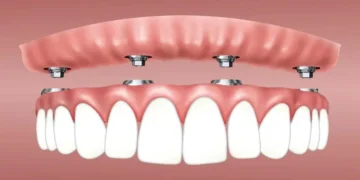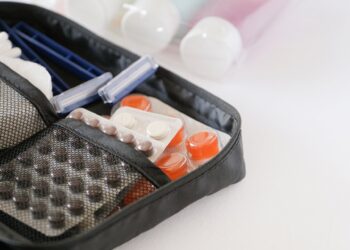The significance of dental hygiene in preserving healthy teeth and gums cannot be overstated. Inadequate dental care can result in gum disease, tooth decay, and other issues that could lead to discomfort, trouble speaking, and low self-esteem.
Maintaining good dental health requires lifelong care. Even if you’ve received feedback that your teeth look lovely, it’s still essential to take daily precautions to keep them healthy and avoid issues.
Developing healthy habits, like brushing your teeth at least twice daily and scheduling regular visits to a Marietta dentist, is the most effective way to safeguard oral health. You can’t deny that people who recognize the significance of preventive dentistry have the healthiest smiles.
It’s not too late to begin managing your dental health. You can easily maintain oral hygiene and keep your teeth in good condition by following the tips below.
Table of Contents
Limit Sugary Drinks and Food
Do you ever experience rough or dirty teeth? If so, you may be leaving dental plaque beneath your teeth. Sugar is a favorite food of plaque, which uses it to make acid that causes cavities. Plaque on your teeth can be particularly noticeable after consuming sugary meals.
Because many foods people consider healthful are bad for your teeth, always read the labels when you shop. Yogurt flavors, for instance, sometimes contain a high sugar content. Similarly, sports drinks frequently have higher sugar content than one might imagine. It will be simpler to prevent oral health problems by limiting sugary foods and beverages.
Avoid Alcohol, Tobacco, and Smoking
One of the worst habits you can have for dental wellness is smoking. Smoking contributes to gum disease, tooth loss, tooth discoloration, plaque accumulation, and oral cancer. Additionally, it hinders the healing process of mouth injuries.
Like smoking, drinking alcohol can have a terrible effect on your oral health. Because alcohol dries out the oral cavity, less saliva is produced, which feeds bacteria and plaque. Too much alcohol is acidic and sugary, which causes tooth decay and tooth loss. Regular drinkers have an increased risk of oral cancer compared to non-drinkers.
Brush Your Teeth Regularly and Gently
Most individuals know that brushing twice daily is one of the most crucial habits for keeping teeth clean and free of microbes and plaque. However, people must brush their teeth with the right approach for effectiveness.
The best way to brush teeth is in small circular movements, carefully brushing each tooth’s top, back, and front. Two to three minutes are okay for this process. It’s best to refrain from sawing back and forth.
You can harm the gum and tooth enamel by vigorous brushing or using a toothbrush with firm bristles. Gum recession, tooth sensitivity, and irreversible damage to the teeth’s shielding enamel are possible outcomes of aggressive brushing.
Use a toothbrush with gentle bristles. Replace your toothbrush every three months or whenever the ends begin to fray.
Use Fluoride-Based Products
There are more factors to consider than flavors and bleaching power when choosing toothpaste. Whichever version you select, ensure your toothpaste has fluoride in it.
Fluoride is still essential for maintaining good oral health despite concerns about its effects on other aspects of health having drawn attention to it.
Insufficient fluoride can result in tooth decay, while fluoride helps avoid cavities. Fluoride protects your teeth by fighting bacteria and creating a barrier. Using fluoride-based toothpaste for cleaning your teeth twice daily will help maintain good oral hygiene and dental wellness.
See your dentist to know if you should buy toothpaste with fluoride or look into alternatives based on your dental challenges.
Use Mouthwash
Mouthwash seems to be a must for maintaining good oral health in advertisements. However, many don’t incorporate it into their daily mouth-cleaning routine because they are unaware of its mechanism. Mouthwashes are an excellent supplementary tool for achieving balance.
By re-mineralizing teeth, lowering acidity in the mouth, and cleaning areas that are not accessible to a toothbrush and flosser, mouthwash aids in maintaining good oral hygiene. Mouthwash has chemical compounds that help maintain oral hygiene and work with brushing and flossing.
Only your teeth, about 25% of your mouth, get cleaned when you brush. However, mouthwash provides the highest cleanliness and protection by cleaning your whole mouth and combating bacteria above and below the gum line.
For suggestions on specific mouthwashes, ask your dentist. Some brands are better for kids and people with sensitive teeth. Additionally, prescription mouthwash is accessible.
Floss Daily
Although flossing isn’t the most enjoyable dental hygiene practice, it’s crucial for strong teeth and gums. You can remove plaque and bacteria that a toothbrush cannot reach between teeth through flossing. Also, flossing can remove bad breath by clearing food particles and debris between teeth.
Many dentists advise hugging the side of the tooth with upward and downward motions after carefully inserting the floss all through the gum line. Refrain from pulling the floss upward and downward between the teeth, as it can hurt and remove plaque less efficiently.
Promptly Attend to Dental Problems
One of the most valuable pieces of advice for maintaining the health of your teeth is this one. It’s always simpler to address a minor issue than a major one, and dental care is no exception. See a specialist immediately if you observe red, inflamed gums because they could cause tooth loss or infection.
Visit Your Dentist Every 6 Months
Your daily routine plays a critical role in your overall dental health. Even so, frequent dental visits are necessary, even for the most conscientious brushers and flossers. Visit your dental practitioner twice a year for cleanings and examinations. A dentist can detect possible problems, offer treatment options, remove calculus, and check for cavities.
Some dental insurance plans even cover regular dental exams. If this applies to you, seize the opportunity. Regular checkup is beneficial if you have previous experience with dental problems, such as gingivitis or recurrent cavities.
Keeping Your Teeth Healthy
From childhood to adulthood, maintaining good dental hygiene can help you keep healthy teeth and gums.
You can prevent gingivitis, tooth decay, and other dental problems by brushing and flossing daily, quitting smoking, maintaining a nutritious diet, and scheduling routine dental exams. Your general health may also benefit from it.


 Home
Home









